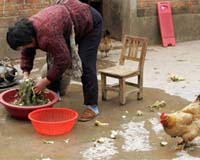 |
Shanghai (AFP) March 1, 2010 After three months in legal limbo in Japan, Chinese rights campaigner Feng Zhenghu says he is not wasting any more time. Feng was forced to camp out near an immigration counter at Tokyo's Narita airport after the Chinese government refused on several occasions to let him come home, in a case reminiscent of the Tom Hanks film "The Terminal". In the two weeks since his ordeal ended, he has entertained other rights activists, drunk tea with state security police and is attempting to sue Shanghai immigration authorities for blocking his return. Feng says he is ready to resume his work and hopes the media exposure given to his case will give him an advantage. "I'm not afraid," Feng told AFP in his flat in northeast Shanghai, sitting in front of a cabinet full of books. "I've been imprisoned, under house arrest and kidnapped, so I've already experienced it all," the small 55-year-old added with a laugh. After 92 days at Narita, Feng was finally allowed to return to China on February 12, just in time for the New Year holiday, after international media drew attention to his plight. The campaigner has spent years advocating the rule of law and using his self-taught knowledge of the Chinese legal system to help those whose rights have been violated in the communist-ruled country. That, he says, was why authorities refused to let him back in after a trip to Japan in April to see his sister, who lives there, and why he is now under surveillance. Camping out on airport benches, he was unable to wash or sleep properly and survived on water alone for the first few days. Soon, though, word spread and people started bringing him supplies. Supporters also sent food packages via friends travelling through Narita. "I was also deeply moved by the air hostesses from Canada, the United States, Taiwan, Hong Kong and Singapore," he said. "They would often greet me, and once they knew what I liked to eat they would bring it to me." Feng, who is married and has a son studying in Japan, says he has experienced rights violations first-hand. While in Beijing in February 2009 he was detained by what he says were Shanghai government employees and police. "I was in a busy part of Beijing and as I walked towards a crossroad a van rushed towards me, people jumped out and pushed me into the van. We stopped at a small hotel for a bit and then they took me to the train station," he said. "They waited for a train to come, put me on the train and took me back to Shanghai to a hotel room where I stayed 41 days." Feng said three people watched him at all times and he never got an explanation for his detention. Activists and rights campaigners in China are regularly detained during sensitive times, and the nation marked several major anniversaries in 2009, including the 1989 crackdown on Tiananmen pro-democracy protests. "Law is a contract between the government and the people, and if a country doesn't respect its laws, it can be really scary -- no one has a sense of security," Feng said. "Anyone can arrest you, anyone can release you -- it's really scary." Feng started his career as an economist and scholar in the 1980s. But in 1989, the China Institute for Enterprise Development, which he headed, published an open letter opposing the army's repression of the Tiananmen democracy movement. After the protests were crushed, he was black-listed. After that, he went to study in Japan, and eventually came back to Shanghai, where he published information on Japanese investment in China. Authorities deemed it an illegal publication and he was sentenced to three years in prison in 2000. He got into legal activism upon his release in 2003. He says all the attention given to his surreal airport existence will be "quite helpful" for his work. "Media serves as public supervision. They disclose the truth, which helps Chinese citizens assert their rights in accordance with the law," he said. He is now trying to sue the entry-exit inspection department in Shanghai's Pudong district for not letting him come home. Feng says he has only mild political views. "I don't talk about Communism, I don't talk about ideas such as democracy. A country just has to respect its own laws, and if it can do that, it will have integrated into the world," he said.
Share This Article With Planet Earth
Related Links China News from SinoDaily.com
 China to expand rural subsidies for home appliances, autos
China to expand rural subsidies for home appliances, autosBeijing (AFP) Feb 25, 2010 China plans to expand subsidies to help the country's vast rural poor buy home appliances and vehicles, as the government steps up efforts to boost domestic consumption. The range of products eligible for government subsidies will be widened and support will be given to increase sales of "new energy" vehicles, the State Council said late Wednesday after a meeting chaired by Premier Wen Jiaba ... read more |
|
| The content herein, unless otherwise known to be public domain, are Copyright 1995-2010 - SpaceDaily. AFP and UPI Wire Stories are copyright Agence France-Presse and United Press International. ESA Portal Reports are copyright European Space Agency. All NASA sourced material is public domain. Additional copyrights may apply in whole or part to other bona fide parties. Advertising does not imply endorsement,agreement or approval of any opinions, statements or information provided by SpaceDaily on any Web page published or hosted by SpaceDaily. Privacy Statement |